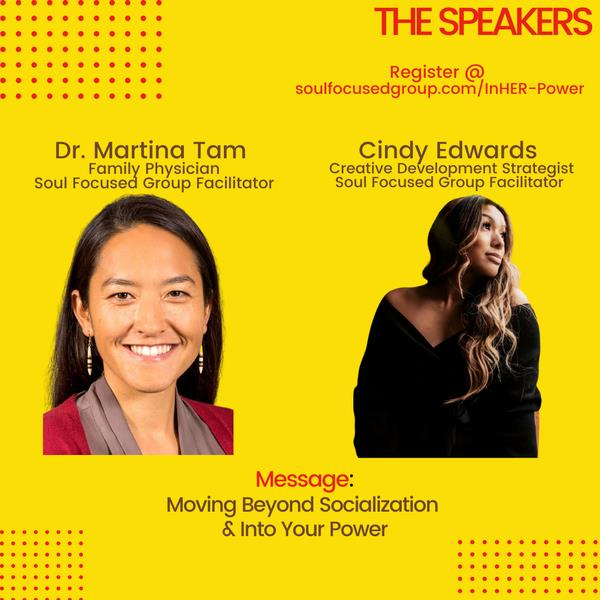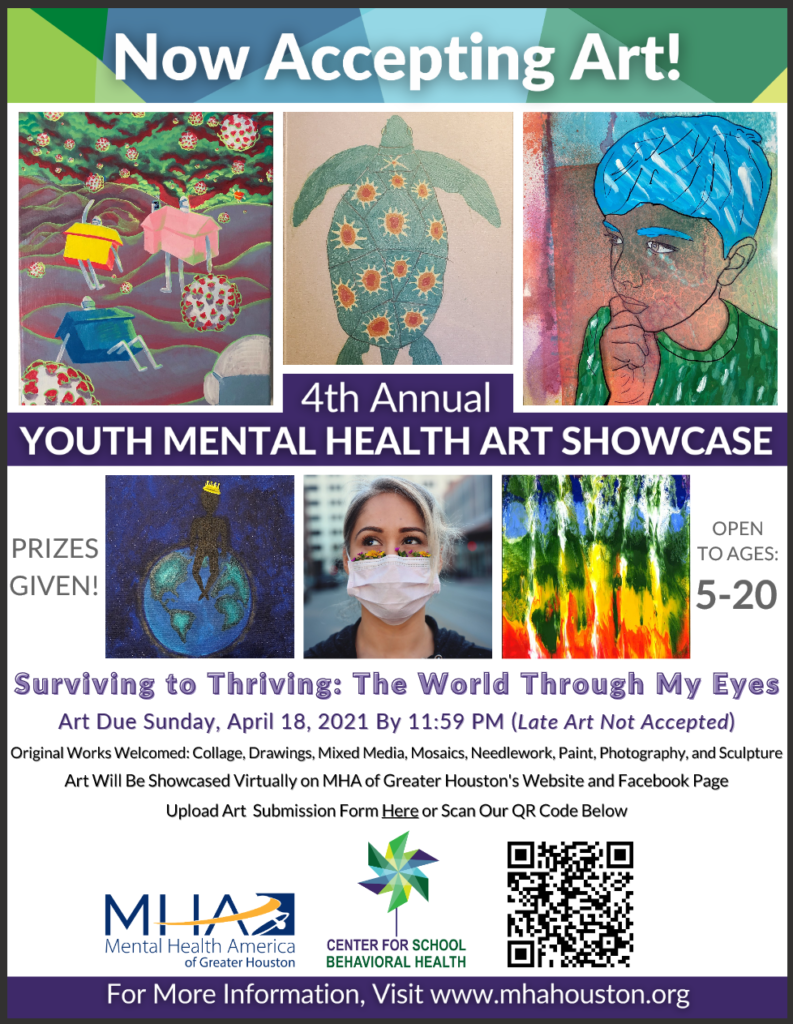Mental Health Resources
The Center for the Healing of Racism is hosting a one-hour presentation in celebration of Asian American and Pacific Islander Month. In light of the recent violence targeted against people from the AAPI community, they will provide an overview of Asian Americans & Pacific Islanders in the Greater Houston area and discuss ideas for building alliances going forward. The presentation will be in English and Spanish. This Zoom presentation is Free and open to the public. All are welcome.
When: Tuesday May 18
Time: 6:00 pm – 7:00 pm
| The Soul Focused Group is excited to collaborate with the Human Solidarity Project and Tirza Motivates, LLC. to host our first Women of Color Virtual event, affectionately titled, InHER-Power: The Path to a Deeper Sense of Self. This event is for women who wish to uncover and transcend into their true selves. |
Save the Date:
April 17, 2021 @1:00 P.M.- 4:00 P.M. EST
To Learn more about the Event and to Register Visit:https://soulfocusedgroup.com/InHER-Power





Follow the link for more information about this opportunity.
Winter Storm Resources-For Helping and Receiving Help
Mayor’s Office of Education
For live updates click this link
Resources for Senior Citizens
CLICK HERE for support from the American Leadership Forum to:
- transport vulnerable populations to a safe place
- delivered food, water, and other needed supplies.
Crowd Source Rescue: Focus on warming vulnerable seniors facing dangerous temperatures with space heaters and generators.
Resources for Differently-Abled
- Houston’s Mayor’s Office for People with Disabilities is partnering with CrowdSource Rescue to deliver bottled water to people who are differently-abled and don’t have access to reliable transportation. Apply at http://crowdsourcerescue.org/freeze
Resources for Homeless
- Houston Area Women’s Center: Shelter and support services for victims of domestic violence. Phone: (713) 528-2121 or visit http://www.hawc.org/
- Star of Hope: The Star of Hope homeless shelter welcomes donations of toiletries such as lotion, shampoo, deodorant, toothpaste and airbrushes, plus diapers (size 0) and pull-up diapers (size 4T and 5T), underwear for men and women (all sizes), towels and washcloths, twin size sheets and blankets. Sohmission.org
Resources for Immigrants
- Immigrant Disaster Resource Guide: bit.ly/ImmigrantDRG
Hotels
- CrowdSource Rescue: Will cover hotel for any TX people needing to pay for it if a nonprofit or organization reaches out to them. The nonprofit or organization should send an email to connect@crowdsourcerescue.org with the details.
- Harris County Sheriff’s Office If you or someone you know is without shelter and in need of transportation, call the Harris County Sheriff’s Office at 713-221-6000 and let them know you are looking for transportation with the HOT Team.
SUPPLIES-Food, water, funds
- Mutual Aid Houston: Fill out this form if you are in need of immediate food or water due to the Houston freeze. Mutual Aid Houston will be distributing $100 via Venmo and CashApp until they hit their distribution limits. https://forms.gle/AWoSsA8L2Y5FJXXH8
- Free Meals for Young Children (from District H Newsletter)
Children under the age of 6 who live in 43 delivery zip codes are eligible for a Kids Meal Inc.’s free meals delivery program. Meals will also be provided for older siblings when school is out. More info on how to apply can be found here or by calling 713-695-5437 with any questions. The application is here in English or Spanish.
- Houston Food Bank helpline: 832-369-9390
- Water Distribution: Click here for a list of distribution sites
- FEMA announced federal emergency aid has been made available to individuals and business owners who sustained losses in the designated area. People can begin applying for assistance by registering online at http://www.DisasterAssistance.gov or by calling 1-800-621-3362 or 1-800-462-7585 TTY.
- Memorial Assistance Ministries Financial Assistance: Financial Assistance Apply online or by phone in English (713) 574-7533 or Spanish (713) 574-7536. Must be low income and live in MAM’s zip code service area: 77008, 77009 , 77018 , 77022 , 77024, 77037, 77039, 77040, 77041, 77043, 77055, 77076, 77079, 77080, 77088, 77091, 77092.
HOME REPAIRS
- Crisis Cleanup: Register online at https://www.crisiscleanup.org/login?from=%2F or call 844-965-1386 to request help with cleanup or building. Volunteers will contact you when they have resources to help. Flier contains more information in Spanish and English.
- Greater Houston Builders Association: List of members here (searchable by the type of professional you need): https://members.ghba.org/memberdirectory
- Disaster resource page to help homeowners rebuild with confidence. Articles on the page cover topics from tips for avoiding scammers when contracting for repairs to documentation for insurance best practices: https://www.ghba.org/disaster-resources/
MENTAL HEALTH
- National Suicide Prevention Lifeline: Call (800) 273-8255 for English or (888) 628-9454 for Spanish.
- Crisis Intervention Hotline of Houston: For 24/7 confidential crisis counseling. Call the general line at (832) 416-1177 or (832) 416-1199 for the Teen Talk Hotline. You can also visit crisishotline.org
- Mental Health Support Line: This new service helps callers 9 a.m.-5 p.m. Monday-Friday. Call (713) 558-3777.
WARMING CENTERS
CLICK HERE for list of Warming Centers from the Coalition for the Homeless of Houston
Other Warming Centers:
- Foster Family YMCA, 1234 W 34th St
- YMCA, 5202 Griggs Rd
- Gallery Furniture, 6006 North Freeway or 7227 W. Grand Parkway South
- Lakewood Church, 3700 Southwest Freeway
- National Association Church, 1605 Air Center Blvd, Phone: 832-626-7111
- The warming center has a capacity to hold up to 500 people and is accepting pets.
- Those who need help finding a warming center, are experiencing homelessness or who are medically dependent on power may call 3-1-1 for assistance. Those outside the city of Houston can call 713.837.0311.
Report Price Gouging: To report price gouging or other disaster scams call 800-621-0508 or file a complaint online athttp://txoag.force.com/CPDOnlineForm.
Track Power Outages: You can track power outages at CenterPoint’s outage tracker: http://gis.centerpointenergy.com/outagetracker/index.htm
Advocacy: Make a public comment on power outages and response to the Texas Senate.
VOLUNTEER OR DONATE
- Volunteer Houston assists agencies who are looking for volunteers throughout Houston. For information, go to volunteerhou.org.
- The Houston Food Bank needs nonperishables such as peanut butter, canned proteins, protein bars and other things that don’t require cooking. To register for volunteer work or to make a donation visit www.houstonfoodbank.org or call 713-547-8604.
- Interfaith Ministries for Greater Houston: This agency administers programs ranging from Meals on Wheels to Animals, and offers refugee services and promotes interfaith and community partnerships. The facilities are closed through the end of the week, but for future volunteer opportunities or to make a donation go to imgh.org.
- Salvation Army: Offers a variety of services from disaster relief to homeless shelters, food pantries, job training and rehab. Salvationarmyusa.org
- Text-to-Give Campaign Benefitting Houston Food Bank: Text ABC13 to 41444 to make a donation of any amount
- Donate Blood with the Gulf Coast Regional Blood Center: The severe winter weather has caused planned blood drives to be cancelled. Gulf Coast Regional Blood Center Headquarters: (713) 790-1200 or 1 (888) 482-5663
- Coalition for the Homeless: working with governmental entities to ensure needs of people experiencing homelessness are met as cold front impacts our region
- Lucille’s 1913 Community Kitchen: To help them with preparing and distributing hot meals for those in need, go to the website for donation and volunteer information. Venmo info@lucilles1913.org, Paypal donate@lucilles1913.org
- Participate in a Supply Drive: Cajun Navy and Cajun Commissary have partnered with Gallery Furniture to organize a supply drive and distribution. They are asking for bottled water and non-perishable food and blankets.
- Bread of Life Disaster Relief Assistance Fund: Beyonce and her BeyGOOD Foundation are partnering with Bread of Life and Adidas. Bread of Life Disaster Relief Assistance Fund offers “one-time financial assistance to those who’ve experienced a sudden or emergency-related financial hardship due to an unforeseen or unavoidable event.
- Act Blue: 100% of your donation will automatically be split between these organizations on the ground providing immediate relief:Family Eldercare, Corazon Ministries, Food Bank of the Rio Grande Valley, Central Texas Food Bank, Houston Food Bank, Food Bank of West Central Texas, The Bridge Homeless Recovery Center, North Texas Food Bank, Southeast Texas Food Bank, Feeding Texas, South Texas Food Bank, and ECHO (Ending Community Homelessness Coalition)
News Articles
February is Black History Month, a commemoration that began as a weeklong observance in the late 1920s but was never meant to be confined by days on a calendar, and even though it was indeed a celebration it was also always meant to highlight the kinds of critical reflection and contemplation fundamental to the recovery of Black history. In that spirit, I want to briefly relay a calendar of events related to work in African American life and history — occasions taking place virtually at Rice in the weeks ahead, and also at other virtual venues featuring members of the Rice community. I think you’ll find the events below informative and thought-provoking. This kind of work, bearing on critically important issues in Black life and history, is continuously underway at the university, and February is always a particularly good time to get to know more of it.
Below are events, you can participate in as you are looking to learn and grow.
Feb. 22
3 p.m.
“Rockwell Lecture: Alumni Panel” with Stephen Finley, associate professor at Louisiana State University; Biko Gray, assistant professor at Syracuse University; and Margarita Guillory, associate professor at Boston University.
Feb. 25
Noon
“Rockwell Lecture: Confronting Structural Racism as Human Suffering” with Rhonda V. Magee, professor at the University of San Francisco School of Law.
Feb. 25
Join Rice’s Center for African and African American Studies, the Rice Department of History and the Department of Multicultural Community Relations in Rice’s Office of Public Affairs for a virtual lecture by Ya’Ke Smith, an award-winning filmmaker who also serves as an associate professor in the Department of Radio-Television-Film at the University of Texas. For more information contact Jan West: Jan.F.West@rice.edu.
Feb. 26
1:30 p.m.
“Dangerous Creole Liaisons” with Jacqueline Couti, the Laurence H. Favrot Associate Professor of French Studies the Department of Modern and Classical Literatures and Cultures, associate director of the Center for the Study of Women, Gender and Sexuality, and affiliated faculty at the Center for African and African American Studies at Rice; Grégory Pierrot, associate professor of English at the University of Connecticut at Stamford; and Anny-Dominique Curtius, associate professor of Francophone studies at the University of Iowa.
March 4
4 p.m.
Campbell Lecture on Racial Justice: “The Stakes of Racial Justice and the Future of American Democracy” with Eddie Glaude Jr., chair of African American studies at Princeton University, eminent scholar of African American history and religion, and prominent critic and C-SPAN and MSNBC commentator on racial justice.
March 10
6 p.m.
“What if Black Women Have Always Been the Vanguard of Voting Rights?” with Martha S. Jones, Society of Black Alumni Presidential Professor and professor of history at Johns Hopkins University and its SNF Agora Institute.
March 10-April 21
7-8:30 p.m.
Facing Race: Racism, Resistance and Reckoning in the United States course from the Glasscock School of Continuing Studies.

The Harvard Graduate School of Education is highlighting the research of esteemed Black education scholars as they discuss their commitments to racial justice in education and research.
This is a community inclusive and open event, so please invite faculty, staff, students, family, friends, and community members within and outside of academia!
Please see below and the flyer attached to learn more about our panelists and their critical scholarship
Adolescence is a time for young people to have a healthy start in life. The number of adolescents reporting poor mental health is increasing. Building strong bonds and connecting to youth can protect their mental health. Schools and parents can create these protective relationships with students and help them grow into healthy adulthood.
What Schools Can Do to Protect Adolescent Mental Health
Schools play an important role in good adolescent mental health. Establishing safe and supportive school environments is an effective way to help youth by connecting adolescents to networks of caring peers and adults. Research shows that students with someone at school who cares about them have better academic performance, health, and behavioral outcomes.
A safe and supportive school environment should:
- Provide ongoing development and training to teachers on how to manage classroom by reinforcing positive behaviors and establishing rules, routines and expectations.
- Support student led-clubs, like gay-straight alliances, so students have a safe space to socialize and connect with supportive school staff.
- Facilitate positive youth development activities, like mentoring programs, volunteer opportunities, and programs that connect them to a network of supportive adults.
- Provide parents and families with resources that support positive parenting practices such as open, honest communication and parental supervision.
What Families and Parents Can Do to Protect Adolescent Mental Health
- Communicate openly and honestly, including about their values.
- Supervise their adolescent to facilitate healthy decision-making.
- Spend time with their adolescent enjoying shared activities.
- Become engaged in school activities and help with homework.
- Volunteer at their adolescent’s school.
- Communicate regularly with teachers and administrators.
For more information on adolescent and school health by the CDC, follow this link.
Through funding from the Schweitzer Fellowship, UT Health students and Amaanah Services are launching the Immigrant Health Initiative (IHI) to equip immigrant women with the capacity to take ownership of their own health legacies. Every two weeks, a new short video on a new topic will be posted on social media in three different languages; English, Arabic and Spanish. Please take a few minutes to watch the intro video. Fill the short survey using the link below to help Amaanah Services cover topics that you believe are important. By filling the survey you will also enter for a chance to win a $20 gift card!
Survey Link (English): https://tinyurl.com/AmaanahIHISurveyEnglish
English Video: https://youtu.be/nq670M9mcX0
Survey Link (Arabic): https://tinyurl.com/AmaanahIHISurveyArabic
Arabic video: https://youtu.be/RRcSV2-vTbg
Survey link (Spanish): https://tinyurl.com/AmaanahIHISurveySpanish
Spanish video: https://youtu.be/DtK5rpZXKqw

Aspiring Young Adults Info FormAspiring Young Adults is a mentoring program through GRADcafé by Project GRAD that addresses the personal, educational, and social needs of young adults and adults that are disconnected from education and who are committed to joining the program and working together with their mentor to develop and achieve their specific goals.
A mentee (that is you) needs to be committed to putting in the time, energy, and work in order to reap the benefits of this program. We look forward to meeting you.
Interested? Then REGISTER here!
Social and Emotional Learning Resources
Promoting social and emotional learning (SEL) has become a major focus in schools and youth-serving organizations, as research continues to document the value and importance of such training for both academic and life success. The Resource Finder provides a variety of resources to help you learn about SEL, apply teaching methodologies and assess your efforts.
Learn: Schools have primarily focused on academic learning, but over the past few decades, a growing body of research has shown how efforts to foster social and emotional learning (SEL) in children and youth can make a real difference in children’s lives, both academically and socially, and both now and in the long term. LEARN about what SEL is, why it is important, and the evidence that supports the promotion of social and emotional competence in children and youth.
Apply: How do you foster SEL in children and youth? In this section of the site, we provide links to a broad range of programs, curricula, lesson plans, activities, books, videos and other resources for promoting social and emotional competencies in children and youth.
Assess: How do you evaluate the success of your efforts to foster SEL? In this section of the site, we focus on the importance of “evidence-based practices”, which involves utilizing programs, lessons and activities that have been shown to be effective as well as evaluating the effectiveness of your own efforts.
By learning about mental health and well-being and supporting children who experience mental health difficulties, adults will be better able to create contexts and classrooms in which children feel safe seeking help when needed and in which biases and stigmas are reduced, enhancing children’s feelings of acceptance, belonging and well-being.
Learn: Many mental health disorders first emerge in childhood and adolescence, with an estimated 15-20% of North American children and youth experiencing significant mental health problems. In order to support these students, it is important for adults to foster mental well-being and mental health literacy in their classrooms and schools. This section provides resources for promoting mental health literacy, including learning about mental well-being as well as the mental health disorders that some children and youth faced.
Support: Teachers and adults who work with children and youth play a key role in supporting students who experience mental health difficulties. In this section, find out how you can SUPPORT children and youth by promoting mental well-being in the classroom, reducing the stigma associated with mental health difficulties, increasing students’ willingness to ask for help when needed, and providing accommodations and a context in which troubled youth can achieve optimally.
Browse Resources
Resources for Mental Health Resources
- El Silencio es Violencia – Zoom – Silence is Violence
- InHER-Power: The Path to a Deeper Sense of Self
- Surviving to Thriving: The World Through My Eyes
- MOE: Winter Storm Resources
- Black History Events @ Rice University
- Black Ed Scholars Speak
- Connection is Key to Good Adolescent Mental Health| CDC
- Immigrant Health Initiative (IHI)
- ProjectGRAD: Aspiring Young Adults Mentoring Program
- The University of British Columbia – Social & Emotional Learning Resource Finder